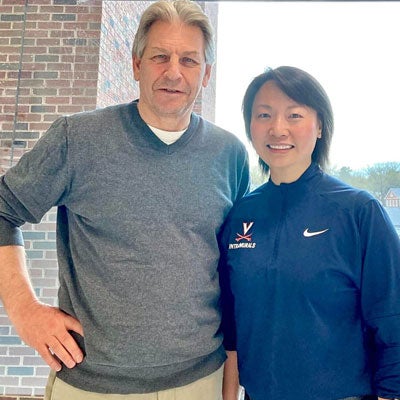
(From left) Doug Bayliss, PhD, and Yingtang Shi, MD
Doug Bayliss, PhD, the Joseph & Frances Larner Professor and chair of the Department of Pharmacology, and Yingtang Shi, MD, an assistant professor of research in the Department of Pharmacology, were awarded a new $3 million grant from the National Heart Lung and Blood Institute, titled “Molecular physiology of Phox2b-expressing RTN chemoreceptor neurons.”
A number of central hypoventilation (i.e., breathing) disorders involve disruption of CO2-dependent reflex control of ventilation and arousal. Phox2b-expressing RTN neurons provide a CO2/H+-chemosensory and integrative role in driving breathing and promoting arousal. Human patients with congenital central hypoventilation syndrome (CCHS) have mutations in Phox2b and severely depressed CO2 chemoreflexes; likewise, mice with CCHS mutations in Phox2b have similarly depressed chemoreflexes and RTN neurons fail to develop.
Phox2b is a transcription factor that regulates neuronal gene expression and differentiation in brainstem neurons; however, its role in controlling the development and function of RTN neurons has not been examined. With their research teams, Drs. Bayliss and Shi will examine the gene regulatory programs orchestrated by Phox2b and its CCHS-inducing mutants. By using novel mouse lines and viral constructs for cell-selective gene manipulation, they will determine how Phox2b contributes to maintenance of molecular, cellular and network characteristics of RTN neurons that allow the physiological control of breathing and arousal that is disrupted in breathing disorders.
Collaborators on the project include Stephen Abbott, PhD, George Souza, PhD, Ira Schulman, PhD and Ed Perez-Reyes, PhD, all in the Department of Pharmacology.
Filed Under: Research
